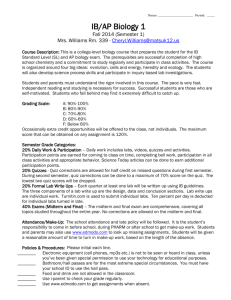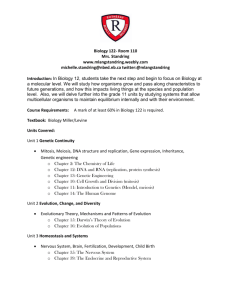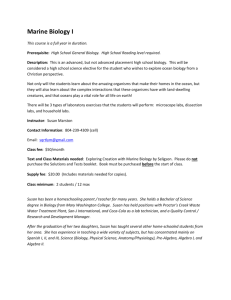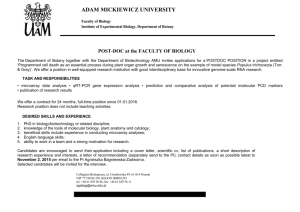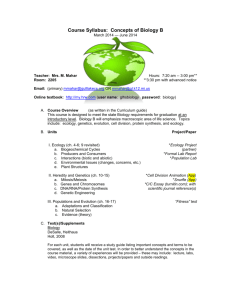Jefferson City High School- Biology Syllabus, 2013
advertisement
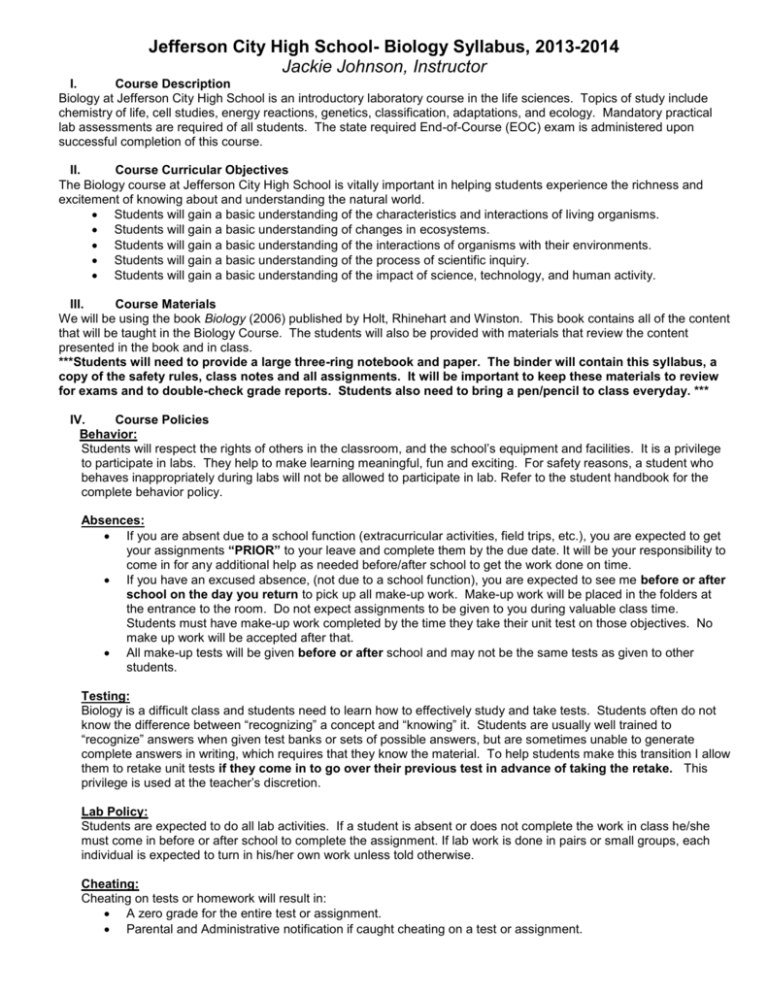
Jefferson City High School- Biology Syllabus, 2013-2014 Jackie Johnson, Instructor I. Course Description Biology at Jefferson City High School is an introductory laboratory course in the life sciences. Topics of study include chemistry of life, cell studies, energy reactions, genetics, classification, adaptations, and ecology. Mandatory practical lab assessments are required of all students. The state required End-of-Course (EOC) exam is administered upon successful completion of this course. II. Course Curricular Objectives The Biology course at Jefferson City High School is vitally important in helping students experience the richness and excitement of knowing about and understanding the natural world. Students will gain a basic understanding of the characteristics and interactions of living organisms. Students will gain a basic understanding of changes in ecosystems. Students will gain a basic understanding of the interactions of organisms with their environments. Students will gain a basic understanding of the process of scientific inquiry. Students will gain a basic understanding of the impact of science, technology, and human activity. III. Course Materials We will be using the book Biology (2006) published by Holt, Rhinehart and Winston. This book contains all of the content that will be taught in the Biology Course. The students will also be provided with materials that review the content presented in the book and in class. ***Students will need to provide a large three-ring notebook and paper. The binder will contain this syllabus, a copy of the safety rules, class notes and all assignments. It will be important to keep these materials to review for exams and to double-check grade reports. Students also need to bring a pen/pencil to class everyday. *** IV. Course Policies Behavior: Students will respect the rights of others in the classroom, and the school’s equipment and facilities. It is a privilege to participate in labs. They help to make learning meaningful, fun and exciting. For safety reasons, a student who behaves inappropriately during labs will not be allowed to participate in lab. Refer to the student handbook for the complete behavior policy. Absences: If you are absent due to a school function (extracurricular activities, field trips, etc.), you are expected to get your assignments “PRIOR” to your leave and complete them by the due date. It will be your responsibility to come in for any additional help as needed before/after school to get the work done on time. If you have an excused absence, (not due to a school function), you are expected to see me before or after school on the day you return to pick up all make-up work. Make-up work will be placed in the folders at the entrance to the room. Do not expect assignments to be given to you during valuable class time. Students must have make-up work completed by the time they take their unit test on those objectives. No make up work will be accepted after that. All make-up tests will be given before or after school and may not be the same tests as given to other students. Testing: Biology is a difficult class and students need to learn how to effectively study and take tests. Students often do not know the difference between “recognizing” a concept and “knowing” it. Students are usually well trained to “recognize” answers when given test banks or sets of possible answers, but are sometimes unable to generate complete answers in writing, which requires that they know the material. To help students make this transition I allow them to retake unit tests if they come in to go over their previous test in advance of taking the retake. This privilege is used at the teacher’s discretion. Lab Policy: Students are expected to do all lab activities. If a student is absent or does not complete the work in class he/she must come in before or after school to complete the assignment. If lab work is done in pairs or small groups, each individual is expected to turn in his/her own work unless told otherwise. Cheating: Cheating on tests or homework will result in: A zero grade for the entire test or assignment. Parental and Administrative notification if caught cheating on a test or assignment. V. Grading Policy/Assessment Grade Scale The grading scale for all courses at Jefferson City High School is: A AB+ B 93-100 90-92 87-89 83-86 BC+ C C- 80-82 77-79 73-76 70-72 D+ D DF 67-69 63-66 60-62 59 & below Weighting System of Grade Calculation The term grade will be determined as follows: Tests and quizzes are worth 54% of the course grade. Labs are worth 22.5 % of the course grade. Homework and daily work are worth 13.5% of the course grade. Comprehensive Exams are worth 10% of the course grade. VI. Course Procedures Students need to be in their seats when the bell rings and begin working on the kick-off question. Biology class is to be used for the study of biology. Any homework from other classes that is out when you should be working on biology will be confiscated. Labs need to be cleaned up appropriately before the end-of-class bell rings. No late passes will be written. There should be no used paper towels or lab materials left on the floor or counters, the sinks and strainer should be clean, and lab equipment returned to the proper place. Students must be in their seats at the end of class in order to be dismissed. The teacher will dismiss the students, not the bell. VII. Additional Information I am usually at school by 7:00 a.m. and stay until about 4:00 p.m., when I leave to pick up my kids. My door will always be open, so please come by to ask for help, check on grades, or just visit. Biology is an exciting class but requires effort, and I expect you to do your best. VIII. Biology Syllabus Units Time (approximate) Standards Unit 1: Introduction to Ecology 2 weeks 3.1.C,E, 4.1.A,B,C,D, 4.2.A,B, 4.3.C, 5.3.A, 6.1.B, 7.1.A,B,C,D, 8.3.D Unit 2: Cell Biology 7 weeks 1.1.I,H, 1.2.F, 3.1.C, 3.2.A,B,D,F, 3.3.A,C, 8.1.A, 8.2.A,B Unit 3: Protein Synthesis and Heredity 6 weeks 3.1.C, 3.2.E, 3.3.A,B,C,D,E, 8.1.A, 8.2.A, 8.3.B Unit 4: Evolution 2 weeks 4.3.A,B,C, 8.2.B Unit 5: Population Ecology 1 week 4.1.B,C,D, 5.3.A, 8.3.B Note: CLEs 7 and 8 are covered incorporated into all units.


